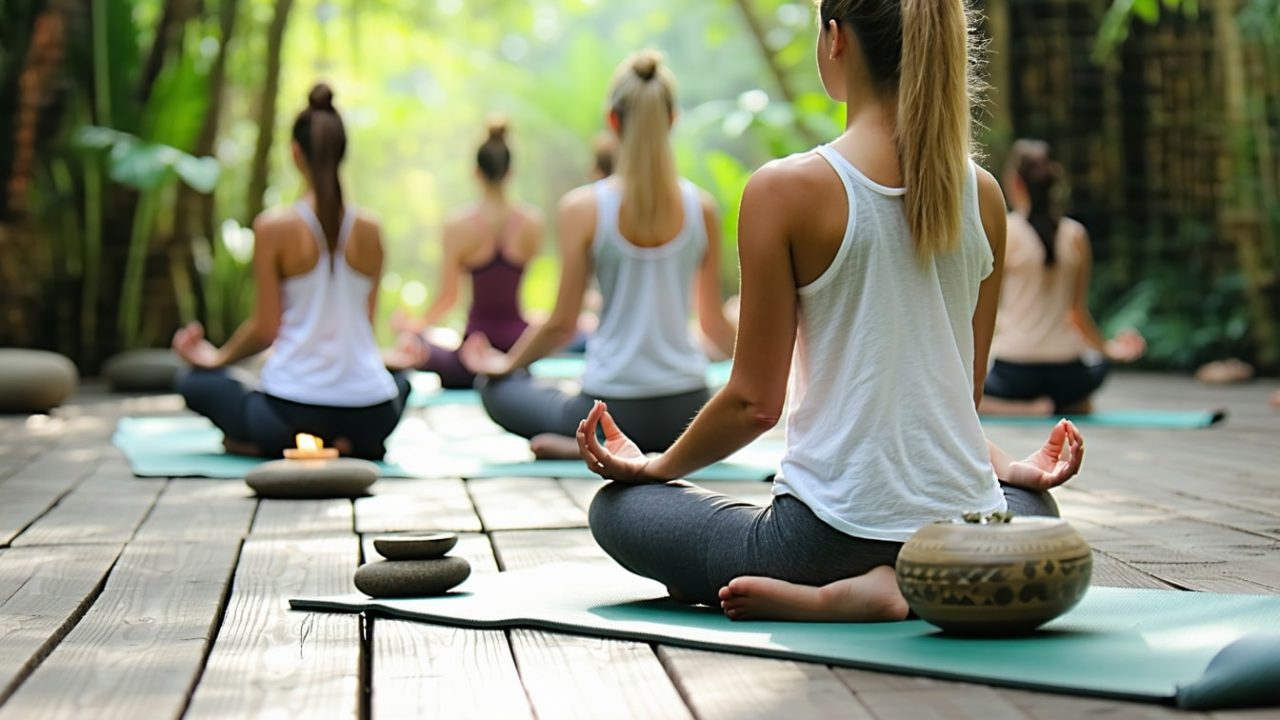The Benefits of Yoga in Addiction Recovery
Yoga has emerged as a powerful tool in addiction recovery, especially for individuals in need of supportive therapies during detox and rehabilitation. You may be wondering how incorporating yoga into your treatment plan can benefit you or a loved one. Below, we explore the detoxification benefits of yoga and its positive impact on mental health.
Yoga for Detoxification
Yoga poses can enhance the detoxification process by stimulating the body’s natural systems. Certain poses like Child’s Pose, Cat-Cow Pose, and Legs Up the Wall help improve digestion, circulation, and relaxation. These poses not only aid the body’s ability to flush out toxins but also support the liver, enhancing its function and promoting liver health. The gentle movements combined with deep breathing encourage the body to release stored toxins and stress, making yoga an effective component of any detox program.
| Pose | Benefits |
|---|---|
| Child’s Pose | Aids digestion, reduces stress |
| Cat-Cow Pose | Improves circulation, calms the nervous system |
| Legs Up the Wall | Promotes relaxation and enhances lymphatic flow |
Mental Health Benefits of Yoga
Yoga also plays a significant role in promoting mental well-being, which is essential during addiction recovery. The practice encourages mindfulness, allowing you to stay present and aware without judgment. This heightened awareness can lead to reduced stress and anxiety, contributing to an overall improved quality of life.
The comprehensive benefits of yoga therapy for mental health include stress relief, enhanced sleep quality, and a strengthened immune system. These elements are crucial for individuals navigating the recovery journey, especially as they transition through various stages of healing. As such, yoga not only supports physical detoxification but also fosters emotional stability, setting a robust foundation for sustainable recovery.
Integrating yoga detox support into your treatment plan at Nova Transformations can significantly enhance your overall recovery experience, helping you build resilience and achieve long-term success.
Types of Yoga for Recovery
Choosing the right type of yoga can enhance your detox support during addiction treatment. Each yoga style has unique benefits that can aid in your recovery journey. Below, we explore three popular types of yoga: Hatha and Vinyasa, Hot and Bikram, and Yin yoga.
Hatha and Vinyasa Yoga
Hatha and Vinyasa yoga are foundational styles that promote physical well-being. Hatha yoga focuses on basic postures and alignment, making it accessible for beginners. It emphasizes breath control and mindfulness, which can be beneficial in managing stress and anxiety during recovery.
Vinyasa yoga, on the other hand, involves a flow of movements coordinated with breath, creating a dynamic and energizing practice. This style enhances flexibility, strength, and endurance, which can support overall physical health during detox.
| Yoga Type | Key Benefits |
|---|---|
| Hatha Yoga | Improves alignment, builds strength, enhances relaxation |
| Vinyasa Yoga | Boosts endurance, increases flexibility, improves cardiovascular health |
Both styles facilitate a deeper connection to your mind and body, helping you cultivate mindfulness and emotional awareness that are crucial in overcoming addiction.
Hot and Bikram Yoga
Hot yoga and Bikram yoga are practiced in heated rooms to increase flexibility and aid in detoxification. Hot yoga is generally less structured than Bikram and allows for various poses to be included in the session.
Bikram yoga consists of a specific sequence of 26 postures performed in a heated environment. The heat helps promote sweating, which can assist in eliminating toxins from the body. This type of yoga can challenge your physical limits, fostering resilience and determination.
| Yoga Type | Key Benefits |
|---|---|
| Hot Yoga | Increases flexibility, promotes detoxification, enhances cardiovascular health |
| Bikram Yoga | Targets detox, improves stamina, enhances concentration |
Participating in these heated classes can create a sense of community and accountability, aiding in your recovery.
Yin Yoga
Yin yoga is a slower, more restorative practice that targets the connective tissues and deep fascia in your body. Poses are held for longer durations, promoting flexibility and relaxation. This type of yoga is particularly helpful in managing stress and improving mental clarity.
Yin yoga incorporates mindfulness techniques that encourage presence in the moment, which can be essential for emotional healing. The quiet nature of this practice allows for deep introspection, helping you to process emotions and experiences related to your recovery.
| Yoga Type | Key Benefits |
|---|---|
| Yin Yoga | Promotes deep relaxation, enhances flexibility, fosters emotional healing |
Incorporating any of these yoga styles into your detox support regimen can significantly enhance your overall recovery experience. Nova Transformations offers tailored programs that integrate various yoga practices, allowing you to benefit from the holistic approach to recovery. For more information on our treatment services, please visit our page on alcohol addiction treatment or explore our opioid addiction program.
Incorporating Yoga in Detox Programs
Integrating yoga into detox programs can significantly enhance the support offered during the recovery process. Two effective practices to include are pranayama and cleansing twists and inversions.
Pranayama Practices
Pranayama, or breath control, is a fundamental aspect of yoga that comprises four main parts: inhalation (Puraka), retention (Antara Kumbhaka), exhalation (Rechaka), and suspended breath (Bahir Kumbhaka). These components work together to improve oxygen absorption, stimulate the nervous system, and foster a deep connection between the physical and mental aspects of the practitioner (Rishikul Yogshala).
Incorporating pranayama into detox programs can promote overall well-being by encouraging balance and health. The practice helps individuals reconnect with their vital life force (Prana shakti), leading to improved physical and mental health. This is especially valuable during the recovery process from drug and alcohol addiction, where emotional and psychological stability is critical.
A regular pranayama routine can reduce anxiety and stress levels, which often accompany withdrawal symptoms. You can begin with simple breathing exercises and gradually advance to more complex techniques.
Cleansing Twists and Inversions
Certain yoga poses can stimulate detoxification pathways and enhance organ function. Cleansing twists and inversions, in particular, are effective for promoting internal cleansing and boosting overall health.
-
Cleansing Twists: Poses like Ardha Matsyendrasana (Half Lord of the Fishes Pose) help massage the internal organs, encouraging detoxification. These twists can also improve digestion and stimulate the liver, enhancing your body’s ability to process toxins.
-
Inversions: Inverted poses like Halasana (Plow Pose) stimulate the thyroid, improve circulation, aid lymphatic drainage, and encourage detoxification. Inversions can revitalize the body, reduce swelling, and support recovery by facilitating the flow of energy, which can be particularly beneficial for those in addiction recovery.
Implementing these practices within detox programs can enhance your recovery experience. For more in-depth guidance on addiction treatment options and modalities, consider exploring our services for alcohol addiction treatment, heroin addiction recovery, or opioid addiction program. Making a commitment to holistic practices like yoga can yield lasting benefits in your journey toward recovery.
Yoga as a Tool for Emotional Healing
In the journey of recovery from substance use disorders, emotional healing is a vital component. Yoga serves as an invaluable tool for fostering resilience and emotional management, equipping you with the skills needed to navigate life’s challenges and maintain long-term sobriety.
Resilience and Emotional Management
Practicing yoga promotes qualities such as strength, endurance, and flexibility, but its true power lies in enhancing your emotional resilience. Through regular practice, you cultivate the ability to face adversity with a calm mind, enabling you to respond to stressors without resorting to old habits. As indicated by BlueCrest Health Group, yoga and meditation help nurture resilience by encouraging you to process emotions constructively and treat yourself with kindness.
Yoga encourages a deeper connection with oneself, ultimately helping you to release trauma and support detox success. The mindfulness gained through yoga practice allows you to remain present and aware of your emotional state, equipping you with improved self-control when facing cravings or triggers.
Mindfulness and Emotional Stability
Mindfulness is a key aspect of yoga, promoting mental health by reducing stress and improving overall quality of life. It encourages you to observe thoughts and feelings without judgment, fostering emotional stability (Healthgrades). Engaging in mindfulness practices not only enhances your emotional awareness but also strengthens your connection to others, creating opportunities for community support.
Research shows that emotional healing and resilience are crucial during the detox journey. As you practice yoga, you develop tools that enhance your ability to manage emotions, contributing to sobriety maintenance and personal growth (BlueCrest Health Group). Regularly incorporating yoga into your recovery plan can ultimately support you in overcoming psychological barriers associated with addiction.
If you or a loved one are considering treatment options, it’s essential to explore holistic approaches like yoga detox support. This method can complement traditional therapies offered in our alcohol addiction treatment, fentanyl addiction program, and various others tailored to individual needs. Embracing yoga in recovery enhances emotional resilience and facilitates a smoother journey towards lasting health and wellness.
Long-Term Recovery Support Through Yoga
Post-Detox Mindfulness
Incorporating yoga into your recovery plan provides vital tools for post-detox mindfulness. This practice promotes self-awareness and emotional stability, aiding you in managing cravings and triggers effectively. By engaging in mindfulness through yoga, individuals can foster a deeper connection with their thoughts and feelings, which is crucial during long-term recovery. Evidence shows that yoga and meditation help maintain sobriety by enhancing emotional awareness and resilience.
You can expect to gain improved mental clarity and reduced anxiety, which are beneficial for navigating daily challenges. Regular practice can also enhance your overall quality of life by establishing a routine that encourages personal growth and well-being.
Managing Cravings with Yoga
Yoga is also an effective strategy for managing cravings during recovery. Through a combination of physical postures and focused breathing techniques, yoga helps reduce stress and promote calmness. This is essential as cravings often trigger heightened emotions and stress responses. Engaging in yoga regularly can strengthen your ability to handle these difficult moments, allowing you to maintain a calm and clear mind while navigating the complexities of recovery (Positive Sobriety Institute).
Moreover, yoga encourages a sense of community and connection, which can be invaluable during recovery. Connecting with others in a shared practice can foster support and friendship, further aiding your journey to sobriety. The physical benefits, such as increased flexibility, energy levels, and overall physical health, contribute to your motivation for lifestyle changes that support a substance-free life.
For additional support tailored to your needs, consider exploring our outpatient programs and recovery coaching options at Nova Transformations. Taking the step to include yoga and mindfulness practices in your recovery framework can make a meaningful difference on your path to lasting change.
Yoga Therapy in Recovery
Incorporating yoga into recovery programs can provide substantial benefits for individuals dealing with addiction. The practice not only supports physical health but also enhances mental well-being, making it an important component of holistic treatment approaches such as those offered by Nova Transformations.
Stress Relief and Pain Management
Yoga effectively reduces stress and helps manage physical pain. Research indicates that yoga can significantly alleviate discomfort while also improving flexibility, functional mobility, and balance (NCBI). The combination of physical postures, breathing exercises, and mindfulness practices fosters relaxation and helps regulate cortisol levels — a hormone associated with stress.
Studies show that yogic therapy promotes mental health by improving overall quality of life and allowing individuals to stay present without judgment (Healthgrades). This approach to mindfulness can be instrumental for those in recovery, providing tools to manage anxiety and emotional upheaval effectively.
| Benefits of Yoga for Stress Relief and Pain Management | Description |
|---|---|
| Reduces stress | Lowers cortisol levels and promotes relaxation. |
| Alleviates pain | Enhances flexibility and mobility; improves overall comfort. |
| Improves quality of life | Fosters mindfulness and emotional awareness. |
Immunity Boost and Mental Wellness
The role of yoga in boosting immunity is well-documented. Engaging in regular yoga practice can enhance immune function and promote better liver health, contributing to the body’s detoxification processes (Healthgrades). This is particularly crucial for those recovering from substance use disorders as a robust immune system can support overall health.
Additionally, yoga offers significant mental health benefits. It has been shown to increase serotonin levels, which can elevate mood and contribute to emotional stability, while decreasing levels of monamine oxidase — an enzyme that breaks down neurotransmitters (NCBI).
| Benefits of Yoga for Immunity and Mental Wellness | Description |
|---|---|
| Boosts immune system | Supports health and detoxification processes. |
| Increases serotonin levels | Elevates mood and aids in emotional stability. |
| Enhances mental wellness | Promotes overall psychological health through mindfulness. |
By integrating yoga therapy into recovery programs, you can address both physical and mental health challenges associated with addiction, thereby creating a comprehensive approach to healing. For more information on how yoga can play a vital role in your recovery, consider exploring mindfulness rehab or consult with professionals experienced in holistic relapse prevention.








